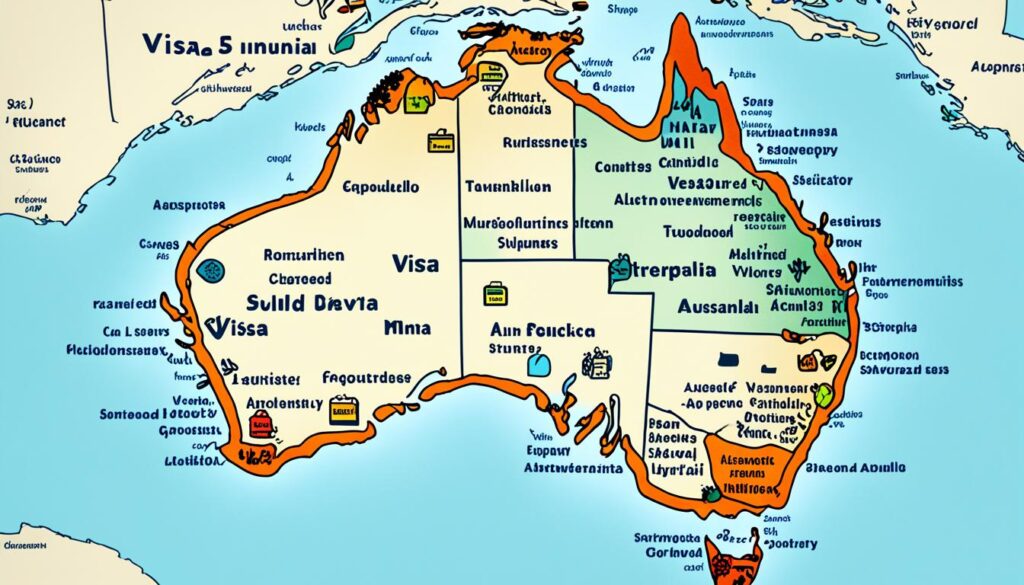Moving to Australia is an exhilarating adventure for many expats, presenting new beginnings and unique experiences in a diverse and vibrant environment. As part of the Commonwealth, Australia offers everything from stunning Outback landscapes to bustling cities and has become a home to approximately 30% of its population who were born overseas, including over 100,000 Americans currently residing in the country1. The Relocating to Australia guide outlines the essential steps to navigate the immigration process, covering numerous opportunities such as the 190,000 skilled worker visas that the Australian government is issuing for the 2023-24 period, making the immigration process to Australia more accessible than ever2.
As you embark on this journey, understanding the overall living costs is crucial. For a family of four, monthly expenses, including rent, are estimated at around $3,914, while a single individual can expect to spend about $1,1051. Here, you will find a blend of outdoor lifestyle options, cultural diversity, and high living standards that make Australia an attractive destination for many looking for tips on moving abroad to Australia.
Key Takeaways
- Australia houses a significant expat community, with diverse cultural influences.
- Numerous visa options are available, particularly for skilled workers.
- Living costs may vary significantly based on family size and location.
- Outdoor activities and a high quality of life are major draws of Australian living.
- Effective planning is crucial for a smooth relocation process.
- Understanding local customs and job market demands can enhance settling in.
Unlock Investment Opportunities Abroad
Introduction to Australia
Australia is a fascinating country known for its unique attributes, vibrant culture, and engaging way of life. This destination attracts newcomers from around the globe, thanks to its welcoming environment and stunning landscapes.
Understanding the Australian Lifestyle
The Australian lifestyle is renowned for its outdoor orientation and relaxed social vibe. With about 29.1% of the population being foreign-born as of 2021, Australians are used to a diverse community and a variety of cultural influences3. The friendly nature of locals creates a welcoming atmosphere for immigrants, including around 90,000 Americans who have chosen to call Australia home3. Enjoying a robust outdoor culture, Australians love spending time at the beaches, parks, and other recreational areas.
Key Facts About Australia
Several key facts about Australia showcase its appeal. The current population stands at approximately 26.5 million, signaling a rich diversity in demographics3. The thriving economy ranks Australia among the top twenty globally3. Landscaping the nation, major cities like Sydney and Melbourne offer thriving environments with distinctive characteristics. Notably, Sydney experiences about 340 sunny days a year, while Melbourne charms residents with its four distinct seasons4. It is also essential for newcomers to be informed about the local currency, which includes notes of $5, $10, $20, $50, and $100, alongside coins in cents and $1 and $2 denominations4. Understanding these key facts is vital for anyone considering moving to this vibrant country, and a good moving checklist for Australia can help streamline the relocation process.
The Pros and Cons of Relocating to Australia

Relocating to Australia is a significant step with various Advantages of moving to Australia and Challenges to consider. Understanding these factors can help in making an informed decision regarding the Australian residency application process.
Advantages of Moving to Australia
Australia is celebrated for its high standard of living, making it a desirable destination for many. As a multicultural society, Australia is especially appealing to British expats and others from around the globe, facilitating smoother integration into the community5. Major cities, such as Sydney and Melbourne, offer robust job markets with competitive wages, particularly in skilled professions5. Furthermore, the education system ranks among the best worldwide, attracting numerous international students to prestigious institutions like the University of Melbourne and the University of Sydney6.
Challenges to Consider
Despite the perks, potential migrants must weigh the Challenges to consider when moving. The high cost of living, particularly in metropolitan areas, can be daunting6. Additionally, many newcomers face language barriers and cultural differences, which can lead to feelings of isolation5. The Australian housing market has been known to be overheated, making property acquisition challenging for many5. Lastly, professional migrants often encounter hurdles related to qualification recognition, necessitating further exams for accreditation6.
How to Move to Australia: The Visa Process

Moving to Australia involves navigating a detailed immigration process to Australia. Understanding the various visa types available and their specific requirements is essential. Australia’s government offers over 120 visa categories, including work visas, family reunification visas, and student visas, each with distinct prerequisites7. These pathways cater to diverse needs and allow individuals to find the best fit for their situation.
Types of Australian Visas Available
There are multiple classes of Australian visas catering to different purposes:
- Skilled Migration Visas: Over 20 work-related visas are available for skilled professionals, particularly individuals under 45, increasing their chances of successful application8.
- Family Sponsorship Visas: Australia grants over 30 visa options for family reunification, allowing citizens and permanent residents to bring relatives to join them9.
- Student Visas: The Student visa subclass 500 is available for international students, which can be valid for up to five years9.
- Business and Investment Visas: These visas allow individuals looking to invest or start businesses in Australia to apply for permanent residency.
Understanding Australian Visa Requirements
Before applying for a visa, it’s vital to grasp the Australian visa requirements. Applicants must submit necessary documentation, which typically includes:
- Proof of identity with a valid passport.
- Health certifications, especially for those relocating on work or student visas, where private health insurance is often encouraged or mandated8.
- Police clearance certificates to ensure safety and security.
Throughout this process, ensuring your application is thorough and accurate will significantly affect your chances of approval. For detailed guidance on how to apply for an Australian visa, resources are available that can provide insights into the application procedures.
Cost of Living in Australia

The cost of living in Australia can vary significantly depending on the city and individual lifestyle choices. Understanding the average expenses in major cities and the current housing market overview will help newcomers balance their budgets effectively.
Average Expenses in Major Cities
Living in major Australian cities often comes with a hefty price tag. On average, households spend approximately $2,200 weekly, which totals about $100,000 per year on living expenses10. In terms of monthly costs excluding rent, a family of four might spend around $3,91411. Here’s a quick overview of average rental prices in key cities:
| City | Average Monthly Rent (AU$) |
|---|---|
| Sydney | AU$2,320 |
| Melbourne | AU$1,820 |
| Brisbane | AU$1,760 |
| Perth | AU$1,540 |
| Adelaide | AU$1,560 |
| Canberra | AU$2,240 |
Unlock Investment Opportunities Abroad
Housing Market Overview
The housing market in Australia is challenging, particularly in metropolitan areas. Sydney and Melbourne are recognized as the most expensive cities, ranked 42nd and 71st globally for living costs respectively10. The rent for a modest shared flat can start at around $600 per week10. The average cost for a move to Australia is approximately $10,50011. It is important for potential movers to research the competitive housing landscape and factor in additional expenses such as utilities, which could reach around $220 monthly for a small apartment10.
Finding Accommodation in Australia
When searching for a place to live in Australia, newcomers often face a pivotal decision between renting or buying property. Understanding these options is crucial for settling down comfortably. Renting is typically the preferred choice for many new arrivals, providing a more flexible and lower-risk option while they acclimate to their new surroundings12. Temporary accommodations such as serviced apartments and Airbnb rentals are often utilized as stepping stones, offering a diverse range of options13. These arrangements can last from a few weeks to a couple of months, allowing individuals to explore neighborhoods before settling on a long-term commitment14.
Renting vs. Buying a Property
When comparing renting vs. buying a property in Australia, various factors come into play. Rental prices can be researched online through platforms like RealEstate.com.au and Domain, showcasing a wide range of options that cater to diverse budgets13. Many rental properties are available at weekly rates, with payment frequencies often varying between fortnightly and monthly13. Newcomers may need to provide additional rental references or proof of employment to enhance their chances of securing a lease in what can be a competitive market13.
On the other hand, buying property can be daunting due to high prices and stricter regulations placed on foreign investments, which often require permission from the Foreign Investment Review Board12. For those considering this route, it is essential to understand that property in Australia is generally acquired through mortgages, which can take decades to pay off without significant savings12. Ultimately, assessing your personal circumstances will help determine the best approach to finding accommodation in Australia.
Job Opportunities in Australia

Australia offers a vibrant job market filled with exciting prospects for both locals and expats. Over one million Brits are currently living and working in Australia, making it one of the most popular expat destinations. Understanding the Australian job market can greatly enhance your employment opportunities, especially given the country’s low unemployment rate of 3.5% and a population exceeding 25 million15.
Understanding the Australian Job Market
The Australian economy is primarily driven by the services sector, alongside significant contributions from industries such as agriculture, tourism, and healthcare. Job seekers should utilize popular job sites in Australia, including SEEK, Jora, and Indeed Australia, which provide tailored searches by location, industry, and role15.
To secure a role in the job market, networking can prove invaluable. Building connections through professional platforms like LinkedIn may help uncover unadvertised positions that perfectly fit your skill set. With skill shortages currently observed in finance, construction, education, engineering, and healthcare fields, there are numerous job opportunities in Australia awaiting skilled workers1516.
In-Demand Professions in Australia
Considering the diverse sectors thriving in Australia, several professions are in high demand. Notable industries include construction, healthcare, and technology, which consistently seek skilled professionals. For individuals aspiring to live and work in Australia, applying for a visa is vital. Skilled workers under 45 years of age may apply for a permanent visa, provided they meet the essential criteria, including a minimum IELTS score of 6.0 and 65 points on the points test16.
Additionally, the average workweek consists of 38 hours, and full-time employees enjoy four weeks of annual leave plus public holidays. This work-life balance, combined with quality healthcare systems, makes working in Australia highly appealing15.
| Industry | In-Demand Professions | Skills Required |
|---|---|---|
| Healthcare | Nurses, Medical Practitioners | Relevant Certifications, Compassion |
| Construction | Engineers, Skilled Tradespeople | Technical Knowledge, Experience |
| Information Technology | Software Developers, Cybersecurity Experts | Coding Skills, Problem-Solving |
| Education | Teachers, Education Administrators | Teaching Credentials, Communication Skills |
Explore more about job opportunities in to find valuable insights into securing a role that matches your ambitions15.
Conclusion
Relocating to Australia presents a unique blend of opportunities and challenges, making it essential to be well-informed before making this significant life change. Whether it’s navigating the visa process, understanding the local job market, or managing the cost of living, a comprehensive relocating to Australia guide can make all the difference. Thorough research and careful planning are vital in ensuring that your move is as smooth as possible.
Utilizing a moving checklist for Australia and connecting with local contacts can greatly assist in streamlining your relocation journey. Additionally, awareness of Australia’s immigration history, where millions have sought opportunity and freedom since its first settlement in 1788, can provide invaluable context for your transition17.
As you embark on this new chapter of your life down under, embracing the diverse culture and vibrant community will undoubtedly enrich your experience. By staying informed and prepared, you are taking the first steps towards a successful relocation and a brighter future in Australia.
Unlock Investment Opportunities Abroad
FAQ
What are the basic steps to move to Australia?
How do I find the right visa for my situation?
What is the cost of living like in major Australian cities?
What should I include in my moving checklist for Australia?
How do I find job opportunities in Australia?
What are some tips for moving abroad to Australia?
Are there any challenges I should be aware of when moving to Australia?
What are the top in-demand professions in Australia?
What should I include in my moving checklist for Australia?
How do I find job opportunities in Australia?
What are some tips for moving abroad to Australia?
Are there any challenges I should be aware of when moving to Australia?
What are the top in-demand professions in Australia?
Source Links
- https://www.uhaul.com/Tips/U-Box/Moving-To-Australia-From-The-United-States-A-Complete-Guide-32077/
- https://earthrelocation.com/moving-to-australia-from-us/
- https://blog.remitly.com/immigration/the-expats-complete-guide-to-moving-to-australia/
- https://www.allied.com/international-moving-company/areas-served/moving-to-australia
- https://www.everythingoverseas.com/30/07/2019/the-biggest-pros-and-cons-of-moving-to-australia/
- https://chuatan.com.au/en/13092/
- https://au.usembassy.gov/travel-and-visas-to-australia/
- https://www.internationalcitizens.com/moving-abroad/to/immigrate-australia.php
- https://visaguide.world/moving-to/australia/
- https://www.moon.com/travel/planning/comparing-cost-living-australia-vs-us/
- https://sirelo.com/moving-abroad/moving-to-australia/
- https://immi.homeaffairs.gov.au/settling-in-australia/settle-in-australia/key-settlement-topics/housing
- https://movetoaus.com.au/before-relocating-to-australia/australian-accommodation/
- https://flatmates.com.au/info/your-guide-to-moving-to-australia-and-finding-a-house
- https://www.prospects.ac.uk/jobs-and-work-experience/working-abroad/work-in-australia
- https://ielts.com.au/australia/prepare/article-how-to-migrate-to-australia-without-job-offer
- https://museumsvictoria.com.au/immigrationmuseum/resources/journeys-to-australia/

Comments